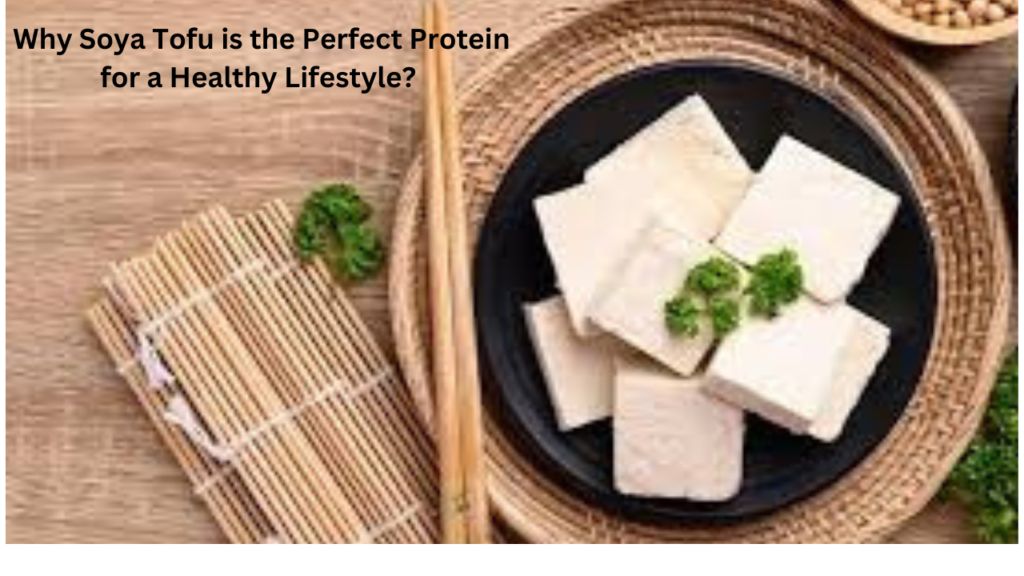
What is Soya Tofu:
- Soya Tofu is made primarily from soybeans, which are soaked, blended, cooked, and then coagulated to make curd. These curds are pressed to form blocks of tofu.
How it’s made from Soybeans :
Soya tofu is a nutritious and versatile food made from soybeans. The process begins with high-quality soybeans. These beans are soaked in water for several hours (typically 8–12 hours) to soften them. After soaking, the soybeans are drained and then blended with fresh water to create a smooth mixture. The blended soybean mixture is then cooked to enhance flavor and deactivate certain enzymes. The cooked mixture is poured through a cheesecloth or fine mesh strainer to separate the soy milk from the soybean pulp (known as Okara). To turn the soy milk into tofu, a coagulant is added. Some of the common coagulants include magnesium chloride (nigari), calcium sulfate (gypsum), or lemon juice.
Different types of tofu (Silken, firm, Soft) :
- Silken Tofu: Soft and delicate, often used in desserts or smoothies.
- Firm Tofu: Has a denser texture, ideal for stir-fries and grilling.
- Extra Firm Tofu: Even less water, making it perfect for frying and baking.
Nutritional Profile of Soya Tofu :
- High in Protein: Soya tofu is an excellent source of plant-based protein, containing about 15.5 grams of protein per 100 grams. This makes it comparable to animal proteins, providing all essential amino acids. Its high protein content makes tofu a great option for athletes, vegetarians, and vegans looking to support muscle repair and growth.
- Low in Calories: Tofu is relatively low in calories, with approximately 70-100 calories per 100 grams (depending on the type). This makes it suitable for those managing their weight while still getting essential nutrients.
- Rich in Essential Nutrients: Soya tofu contains iron, Magnesium and enriched with calcium which are important for energy production, muscle function and important for transporting oxygen in the blood.
Health Benefits of Soya Tofu
- Heart Health: Tofu contains healthy fats and is low in saturated fat, which contributes to heart health. Its isoflavones may help reduce cholesterol levels.
- Bone Health: Tofu is a good source of calcium and magnesium, essential for maintaining strong bones.
- Hormonal Balance: The isoflavones in tofu may mimic estrogen, potentially reducing menopausal symptoms and supporting hormonal balance.
- Digestive Health: Being a good source of fiber, tofu can aid digestion and promote gut health.
Common Myths about Tofu :
- Tofu Is Unhealthy: Many assume tofu is unhealthy due to its association with processed foods. However, It can be a part of healthy diet when consumed in moderation.
- Tofu Is Only for Vegans and Vegetarians: Many people think tofu is exclusively for those avoiding animal products, but it can be a nutritious addition to any diet.
- Tofu Is High in Hormones: Some believe that tofu contains harmful hormones. In reality, the isoflavones in tofu are plant-based compounds that can have beneficial effects on health.
- Tofu Causes Weight Gain: Tofu is low in calories and can actually help with weight management when included in a balanced diet.
Versatility in Cooking :
- Adaptability: Tofu’s ability to absorb Flavors and adapt to different cuisines makes it an invaluable ingredient in many recipes. Whether you’re looking to create a comforting curry or a fresh salad, tofu can enhance your meals while providing a nutritious boost!
- Cooking Tips: Use silken tofu for smoothies and desserts, and firm or extra-firm tofu for stir-fries, grilling, and baking.
With these tips, you can unlock the full potential of tofu in your kitchen. It’s a nutritious, delicious, and adaptable ingredient that can enhance a wide range of dishes. It is always advisable to experiment with different Flavors and cooking recipes. Tofu can be used in everything from soups to salads and desserts. Happy cooking!